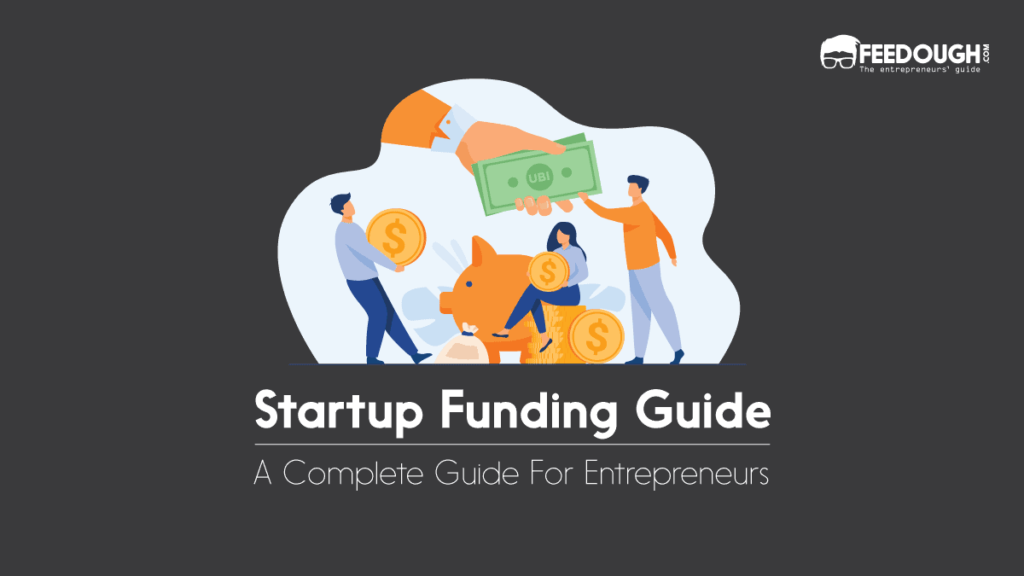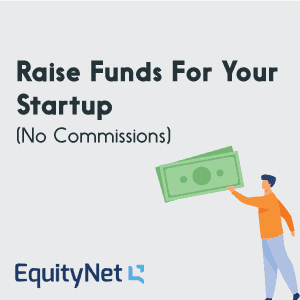The Startup Funding Guide
An entrepreneur's guide to funding their startup
How To Get Startup Funding?
Here's the recipe for a successful startup -
- One great idea,
- One or more passionate founders,
- a good team,
- some early users or customers,
- and, most importantly, initial capital.
Now, most people have a great startup idea and are passionate about it. But what they usually don't have is a pot of money to get their business off the ground. This is where startup funding comes in.
Startup funding is the process of raising capital for your business from investors. These could be venture capitalists, angel investors, government grants, or even your friends and family.
But how do you get these people to invest in your business? And most importantly, what's right for your business?
This is what we're here to answer. In this guide, we'll tell you everything you need to know about getting startup funding, including:
- Why do startups need funding?
- Who all funds early-stage startups?
- Where to find such investors?
- The ways funding is disbursed to startups.
- What do investors look for while investing in startups?
- How to convince investors to invest in your startup?
By the end of this guide, you'll have a clear understanding of how startup funding works and what's the best way to get it for your business.
But before we dive into all that, let's first answer the most critical question:
Investors usually look for a few key things when considering whether or not to invest in a startup. These include the team, the market opportunity, the product or service, the business model, and the competitive landscape.
Some startups may be better off bootstrapping, while others may need investment in order to grow and scale. For example, a startup that requires a lot of expensive equipment or inventory may need investment in order to get off the ground.
There are a few risks associated with taking startup funding, such as giving up equity in the company, dilution of ownership, and losing control of the company. Additionally, there is always the risk that the startup will not be successful and the investors will not get their money back.
Note:
This guide is huge. Fill this form to receive this article as a PDF .
Why Do Startups Need Funding?
It's simple. You don't need funding to validate your business idea. An investor is least interested in giving you millions just so you can figure out whether people actually want to buy your product or not.
So if you're thinking of raising money just because you have a great but invalidated startup idea, think again.
What startups need funding for is to grow their business. And that's what investors are interested in - businesses with high growth potential.
This growth can be in terms of various factors like -
- Hiring key personnel and expanding the team
- Improving product quality
- Creating awareness about the product
- Reaching out to more customers, etc.
Investors love high-growth potential startups because they want to make money from their investment, and the only way to do that is if the startup they've invested in grows exponentially.
Fun Fact
According to CBinsights, failing to raise startup funding is number one reason why most startups fail.
Now that we've got that out of the way, let's take a look at who all funds early-stage startups.

Who All Fund Early Stage Startups?
Focus on the key phrase "early-stage startups" here. This means that the startup is in its initial growth stages and has yet to become profitable.
Not every investor invests in such high-risk ventures. In fact, most investors prefer to invest in established businesses that have a proven track record.
So, who does invest in early-stage startups?
There are a few types of investors who are more likely to invest in early-stage startups. They are:
- Startup Incubators: Startup incubators are organisations that help startups in the early stages of their development. They provide mentorship, resources, and access to required resources to the startup (including funding). Some incubators even fund the startups they work with in return for a small equity stake in the business.
- Startup Accelerators: Startup accelerators are similar to incubators but are more structured and deal with slightly more developed startups. They typically have a specific program that the startups go through. These programs last for a few months; at the end of it, the startups pitch to a group of investors. If the investors like what they see, they also invest in the startup in return for equity.
- Angel investors: Angel investors are usually high-net-worth individuals who invest their own money in startups. They're often the first to invest in a startup and help it get off the ground. In return, they take a higher stake in the company than other investors.
- Venture capitalists: Venture capitalists are professional investment firms that pool money from other investors (such as pension funds and wealthy individuals) to invest in startups. They tend to invest larger sums of money than angel investors but also expect a higher return on their investment. Mostly, venture capitalists invest in later-stage startups that have already proven themselves to be successful. But some venture capitalists are willing to invest in early-stage startups as well.
- Crowdfunders: Crowdfunding is a way of raising money from a large number of people, typically through an online platform. You can think of it as a way of getting small donations from a lot of people instead of large investments from a few people. In return for their investment, backers usually get some kind of reward, such as a product or service from the startup. Some startups even offer equity to their backers.
- Friends and family: Startups often turn to friends and family members for funding, as they are typically more willing to take a risk on an unproven company than professional investors are.
- Government: There are a number of government programs and initiatives that offer to fund to startups. In India, for example, the government offers a number of schemes to support startup businesses, such as the Startup India Initiative.
Read the guide:
Types Of Investments Investors Make In Your Startup
Startup investments are not like usual investments where people simply give you money and wait for returns. Instead, they are more hands-on, and want to see the company succeed. There are five main types of investments that investors can make in your startup:
Equity financing: The most common type of investment made by VCs and angels, equity investment involves giving the investor a share in the company in return for their funding. This type of investment is often seen as high risk, as the investor will only make a return if the company is successful. However, it can also offer the potential for high rewards if the company does well.
Read the guide:
Debt financing: An alternative to equity investment, debt financing involves the investor lending money to the company, which is then repaid with interest. This can be a less risky option for investors, as they will get their money back even if the company fails. However, it can also mean that the company has to give up a larger share of its profits to the investor if it is successful.
Read the guide:
Convertible Debt: This is a type of loan that can be converted into equity at a later date, typically when the company raises additional funding. This can be beneficial for startups as it allows them to delay giving up equity in their company, but it can also be more expensive in the long run if the company's value increases.
Read the guide:
Grants: These are usually offered by government organisations or philanthropic groups and do not need to be repaid. However, they tend to have very specific eligibility requirements and are often only available to companies working in certain industries or pursuing certain types of research.
Read the guide:
Reward-based investments: Usually a model used for crowdfunding where a large number of people invest small amounts of money in exchange for a reward, such as a discount on the product or service once it launches. This can be a good option for companies with a strong customer base as it can help to generate interest and build buzz around the product or service before it launches.
Read the guide:
The 5 Common Rounds Of Startup Funding
Every startup journey is unique, but most will go through similar stages and require different types of funding. The five most common rounds of startup funding are:
Pre-Seed Round
The pre-seed fund is the money you require to validate its problem-solution hypothesis. This is the very first funding stage and is mostly used to cover expenses such as market research, product development, and initial team salaries.
Usually, you cover these expenses yourself or with the help of friends and family. You can also join an incubator or accelerator program that will provide you with some initial funding, resources, and mentorship.
But there are exceptions. Say you plan to develop a rocket ship and need a lot of money. In this case, you look for outside funding from a VC fund or a government grant.
Read the guide:
Seed Round
The seed fund is the initial investment you require to start your business's operations and get it off the ground.
This is when the planning stage ends and you've validated your business hypotheses by conducting market research, developing a product prototype, and testing it with potential customers.
Angel investors are the most active investors in the seed stage and they typically invest between $100,000 to $5 million in a startup.
Other sources of seed funding include incubators, accelerators, and crowdfunding platforms like Kickstarter and Indiegogo.
Read the guide:
Series A
Series A is the first stage of venture capital financing where you start to scale your business by building your team, developing your product, and acquiring customers.
At this stage, you've validated your business model, got initial traction, and are now focused on growth.
Series A rounds usually range from $2 million to $20 million and the most active investors in this stage are Venture Capital firms.
Read the guide:
Series B
Series B is the second stage of venture capital financing and usually happens when a startup has achieved significant growth and is looking to scale even further.
The company will have a much larger team, a more developed product, and be generating revenue at this stage.
Series B rounds can range from $30 million to $100 million.
Venture capital firms and private equity firms are the most active investors in this stage.
Series C And Beyond
Series C and later rounds are for companies that have achieved significant growth and are looking for capital to continue scaling (expanding into new markets, hiring more staff, etc.).
These rounds can range from $30 million to over a few billions.
The most active investors in these rounds are usually private equity firms, venture capital firms, and investment banks.
How To Find Investors For Your Startup?
There are a few ways to find investors for your startup. Some common methods include:
- Personal connections and networking
- Online directories and databases
- Startup competitions
- Going through an accelerator program
- Crowdfunding
Read the guide:
Fun Fact
According to Fundera, almost one-third of the businesses fail to get the financing they need, resulting in their failure.

Personal Connections & Networking
Your existing network can be a great place to start when looking for investors for your startup, especially for the initial funding rounds.
Some of the people you might want to approach include:
- Friends and family members
- Former colleagues
- People you've met through networking events
They are more likely to invest in your business because they know and trust you. Moreover, the initial investment is in the person or the team more than the product or service.
Besides this, networking is also a great way to meet potential investors who might be interested in your business idea.
You can attend startup events, trade shows, and conferences related to your industry. There are also online communities and forums where you can connect with like-minded individuals, such as founders, startup investors, and entrepreneurs.
Some popular networking platforms and events include:
- Startup Weekend: 54-hour events that take place in over 100 countries around the world, aimed at building startups. Several of these events include real investors as judges and mentors
- Startup Grind: A global startup community designed to educate, inspire, and connect entrepreneurs. The community hosts monthly events in over 125 countries and has over 5 million community members worldwide, including entrepreneurs, investors, educators, and more.
- SaaStr Annual: One of the world's largest conferences for SAAS companies attended by over 10,000 SaaS founders, VCs, and others. The event includes over 1,000 sessions and keynotes from some of the top minds in the industry.
- Slush: A student-led, not-for-profit movement founded to change attitudes toward entrepreneurship. Slush has grown into one of the leading startup events in the world. The event is held annually in Helsinki, Finland but they also hold small-scale spin-off events in various cities around the world.
- Y Combinator's The Startup School: One of the most popular startup accelerators, providing seed funding and mentorship to early-stage startups. Their initiatives like The Startup School, which is a 10-week online course teaching how to build a startup, have educated over 100,000 founders worldwide.
Besides this, you can use platforms like LinkedIn, Twitter, and Facebook to search for startup communities, people belonging to your industries, and startup events.
Online Directories And Databases
As an entrepreneur, data should be your best friend. There are a number of online directories and databases that offer detailed information on startup investors, such as:
- Crunchbase: One of the most popular startup databases with information on over 1 million companies, investors, and people in the ecosystem. It's a freemium platform, which means that some features are locked behind a paywall. Use this platform to get information about your niche's companies getting funded, investors investing in companies like yours, and other startups in your space.
- F6S: F6S is a global startup community with over 8 million members. This platform has a section called the Startup Directory which contains a list of startup accelerators, co-working spaces, and service providers. They also have a database of startup jobs, events, and deals.
- AngelList: AngelList is a website that connects startups with investors. They have a database of over 15,000 funds and syndicates and have invested in over 190 unicorns.
- Private Equity List: The Private Equity List is a dedicated directory for private equity firms, venture capital firms, and angel investors. You can segregate them using filters like countries, sectors, and even fund size.
- Funden: Funden is an AI-powered database of startup investors that even provides assisted fundraising services (they introduce you to the investors). Besides this, you also get strategic guidance on fundraising at various stages.
- Funderbeam: Funderbeam is a data-driven startup funding platform that allows startups to raise money from a global investor network.
- Seed-DB: Seed-DB is a global directory of startup accelerators along with their investment data and statistics that you can use to identify the right one for your business.
- Product Hunt: Product Hunt is a website that curates and highlights new tech products. The platform also has a social networking component and a section dedicated to startups. You can find like-minded people, get advice, and read about startups on their blog.
- HackerNews: HackerNews is a social news website focused on computer science and entrepreneurship. It is a great place to find out about new startups, as well as funding opportunities. Various entrepreneurs share their stories on the site, which is a valuable resource for anyone interested in the startup scene.
- VC News Daily: It's a dedicated news platform focusing solely on startups, venture capital, and funding news. You can find articles on the latest funding rounds, as well as advice and insights from VCs themselves.
- Techcrunch: Techcrunch is a widely-read tech blog that covers a range of topics, including startups and funding. They have a dedicated section for startup news, where you can find the latest information on new companies and venture capital funding.
While some of these are actual directories, most of these are news and information platforms that cover the startup scene. You can use them to find investors who fund companies like yours and hop on to the directories like Crunchbase to find their contact information.
Startup Competitions
You can easily get your initial investment by winning some startup competitions. Organised by accelerators, incubators, venture capitalists, and even tech companies, these competitions include:
- Pitch deck competitions
- Business plan competitions
- Prototype competitions
- Business model competitions
- Social impact challenges
- Technology challenges, and so on.
You can find a list of all the startup competitions happening in your city or region on sites F6S and Gust.
The best part about these competitions is that you don't need to have a working startup to participate. Most of the time, all you need is a great well-defined idea for your product and the ability to pitch it well.
If you win, you not only get the prize money but also the attention of VCs and other investors who might be interested in funding your startup.
Startup Accelerator Programs
Accelerators like YCombinator, Techstars, and 500 Startups have proved to be great platforms for startups to not only get mentorship and resources, but also funding.
You can find hundreds of accelerators worldwide, many of which have their specific focus areas. For example, if you're starting a healthcare startup, accelerators like StartX and Rock Health provide great resources and funding opportunities specifically for healthcare startups.
To get into an accelerator program, you generally need to go through a competitive application process. Once selected, you'll be given a small amount of funding and access to resources like office space, mentorship, and networking opportunities.
In return, you'll usually give up a small amount of equity in your company.
Seed-DB is a great resource for finding startup accelerators around the world.
Crowdfunding
The internet has made it possible for anyone to raise money from a large group of people, usually in small increments. This is called crowdfunding.
Crowdfunding platforms like Kickstarter and Indiegogo allow you to pitch your product or service to the masses and solicit funds. These platforms are popular with hardware startups, as they can pre-sell their products and use the funds to finance manufacturing. But you can even use crowdfunding to fund your SAAS business.
For example, the video hosting platform Vimeo used Kickstarter to pre-sell their premium service before it launched. And they raised over $500,000 in just few weeks!
You can choose any of these four crowdfunding business models -
- Rewards Crowdfunding: In this type of crowdfunding, backers are rewarded with some kind of perk or product. For example, if you're starting a food business, you can offer backers a free sample of your product.
- Equity Crowdfunding: In this type of crowdfunding, backers receive equity in your company in exchange for their investment. Equity crowdfunding is only available to accredited investors in the US. But platforms like Equitynet and SeedInvest are changing that.
- Debt Crowdfunding: Like a traditional loan, debt crowdfunding allows you to borrow money from backers and pay them back with interest. The biggest benefit of debt crowdfunding is that you don't have to give up any equity in your company.
- Donation Crowdfunding: In this type of crowdfunding, backers simply donate money to your cause with no expectation of anything in return. Wikipedia, for example, is primarily funded through donations.
The crowdfunding revenue model is a great way to validate your business idea and generate some early buzz for your product. However, it's important to note that not all crowdfunding campaigns are successful. In fact, the success rate is quite low. So before you launch a campaign, be sure to do your research and set realistic goals. Validate:
- Whether the rewards you're offering are attractive to your target audience
- How much money you'll need to reach your goal
- The timeline for your campaign
- Your marketing strategy
- Other risks and challenges associated with crowdfunding
If you decide that crowdfunding is the right route for you, there are a few platforms you can use to get started, including:
- EquityNet: EquityNet is an equity crowdfunding platform that helps startups raise funds from accredited investors.
- Wefunder: Wefunder lets investors, accredited and non-accredited alike, invest as less as $100 in startups in return for equity.
- Fundable: A rewards and equity crowdfunding platform, Fundable is designed for startups that want to raise anywhere from $1k to $10m.
- Kickstarter: A popular crowdfunding platform for creative projects, including art, design, film, games, and music.
- Indiegogo: One of the first online crowdfunding platforms, Indiegogo offers flexible funding options for a wide range of projects.
- Experiment: A platform for scientific research projects, Experiment can be a great option if you're raising money for a new invention or innovation.
- Seed Invest: A equity crowdfunding platform that allows accredited investors to invest in early-stage companies.
- Lending Club: A peer-to-peer lending platform that can be used for a wide range of purposes, including business loans.
- Patreon: While not exactly a crowdfunding platform, Patreon can be a great way to raise money for ongoing projects by offering backers exclusive content or access in exchange for their support.
The Startup Fundraising Process
Even though different startups seem to follow different paths when it comes to fundraising, there is a general process that most of them follow. Here's a quick overview:
- Assess the need for funding and investor readiness
- Pitch deck development
- Investor research and outreach
- Pitch
- Agreement and term sheet negotiation
- Deal
Read the guide:

Assessing The Need For Funding
The first step in the fundraising process is to assess whether or not your startup actually needs funding. In some cases, it might be possible to bootstrap your business and grow it without any outside investment.
There are a few key questions you should ask yourself before deciding to raise money:
- What do I need the money for?
- How much money do I need?
- Have I validated my business model?
- Do I have a solid team in place?
- Do I have early customers or users?
- Is my product or service ready for market?
- What is my burn rate (the rate at which I am spending money)?
These answers will help you determine whether or not you are ready to start the fundraising process. If yes, how much money should you raise, and which type of investor is right for you?
If you've decided that you do need to raise money, the next step is to start reaching out to potential investors. To do that, you'd require a sound pitch deck that tells your story in a convincing and engaging manner.
Pitch Deck Development
A pitch deck is what you use to communicate the story of your business to potential investors. The purpose of a pitch deck is to:
- Generate interest from investors
- Secure investor meetings
- Communicate key points about your business
The contents of a pitch deck vary, but there are certain slides that are essential in order to tell your story in an effective way. These essential slides usually include:
An overview of your business
- The problem you're solving
- Your solution
- The market opportunity
- Your business model
- Your team
- Your traction to date
- Your financials
- How much money you're looking to raise
Your startup pitch deck is more than just a few pretty pictures. In order to make a lasting impression, your deck must be clear, concise, and easy to understand. Additionally, it must be visually appealing and convey the key points of your business in an exciting way.
Usually, you develop two versions of your pitch deck - email deck and presentation deck. Your email deck is a more concise version of your presentation deck that can be easily emailed to potential investors. Your presentation deck, on the other hand, is what you'll use when presenting in person.
Investor Research And Outreach
Once you have your pitch deck ready, it's time to start reaching out to potential investors. The more you research and the more prepared you are, the better your chances of getting funded.
Some things to keep in mind while researching investors:
- Check if the investor has funded companies in your industry in the past
- The stage of funding that the investor is comfortable with (seed, early stage, etc.)
- The geographical region that the investor is interested in
- The size of investment that the investor usually makes
- Whether the investor is an angel, a VC, or a corporate venture capital firm.
Once you've shortlisted some potential investors, it's time to start reaching out. The best way to do this is through personal connections. If you know anyone who knows the investors, ask for an introduction. If not, you can reach out to the investors directly through email or social media.
When reaching out, keep your message short and to the point. Introduce yourself and your startup briefly, and mention why you think the investor would be interested in your company. Include a link to your pitch deck or website so they can learn more.
Once you've made contact, try to set up a meeting or call to discuss your startup in more detail. This is your chance to really sell your company and get the investor excited about what you're doing.
The Pitch
Startup pitches are unlike what TV shows and movies make them out to be. There's no need to be flashy or over-the-top. In fact, investors prefer pitches that are clear, concise, and easy to understand.
You're alloted a limited amount of time to make your pitch, so it's important to be prepared and know what points you want to hit.
The pitch is where your business knowledge and investor research will come in handy. You should be able to answer any questions the investor has about your business, and you should also be asking them questions about their investment preferences and strategies.
The Term Sheet
If the investor is interested in your business, they'll likely present you with a term sheet. This document outlines the terms of their investment, including how much money they're willing to give you and what percentage ownership stake they'll receive in return.
It's important to have an attorney look over the term sheet before you sign it. They can help you understand the legal implications of the terms and negotiate for a better deal if necessary.
The Closing Process
Once you've agreed to the terms, it's time to close the deal. This usually involves signing a few more documents and transferring the money. If all goes well, you'll have the funding you need to get your business off the ground.
How To Convince Investors To Invest In Your Startup?
Investors are businesspeople. So you need to make a good case for why they should invest in your startup and speak of how your company will make them money.
It's that simple.
Portray your business as an investment opportunity with a great ROI potential. Convince them that you're going to make them a lot of money, and they'll be more likely to invest.
Here's how you can do that:

Have A Sound Knowledge Of Your Market
Before you even approach investors, you need to have a firm understanding of your target market and industry.
You should be able to speak numbers, statistics, and other data that will help show them that you know what you're talking about.
The more knowledgeable you are, the more confident you'll sound, and the more likely it is that investors will take you seriously.
Do Your Research On The Investor
Investors are not all the same. Each one has their own preferences, styles, and areas of focus.
You need to do your research on each one before approaching them so that you can tailor your pitch to their interests.
The last thing you want to do is go in cold and try to wing it – that will almost certainly result in a rejection.
Sell An Exit Strategy
Investors want to know that there's a light at the end of the tunnel, and that their money isn't just being thrown into a black hole.
You need to have a clear exit strategy so that they can see how they're going to make their money back (with interest).
This could be through an IPO, being bought out by a larger company, or simply achieving profitability and then paying dividends to shareholders.
Do Your Homework
Besides the knowledge about the investor, you also need to be across your numbers inside out.
You should be able to answer any question they throw at you without hesitation and have a solid understanding of the competitive landscape.
If you can't answer their questions or if you don't understand your own business or the market you're operating in, then they're not going to have much faith in your ability to succeed.
Your Team Matters
Investors will also be looking at your team and assessing whether they believe in their ability to execute the vision. You need to sell your team's skills, experience and passion for the business to the investor.
If you don't have a strong team in place, it will be very difficult to convince an investor to give you their money.
The Startup Naming Guide
Explore the contents



